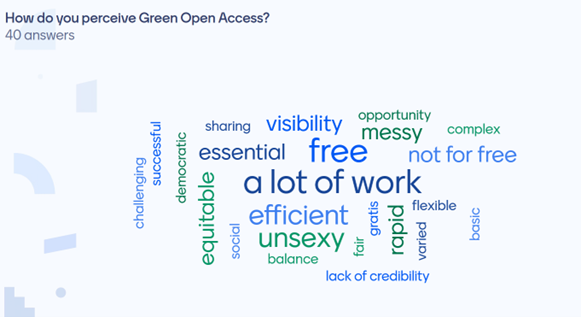As announced in the last post, GOAL project members participated in the webinar organised by swissuniversities on 25 May. The session was lively with 24 participants. In addition to presenting the current state of the project, it was possible to compare opinions on the (un)attractiveness of Green Open Access.
The project is moving forward and, as the downloadable presentation at the end of this post shows, we currently have four main areas of development:
- negotiations with publishers,
- database design,
- workflow design and
- knowledge collection.
All four areas are closely intertwined, i.e. we learn and gather knowledge with each negotiation we conduct, gaining a better insight into the many ways in which Green Open Access can be implemented. For instance, Green Open Access policies can be open to all authors or focused on specific groups, they can have an embargo or not, the text version can vary from the version of record to the author’s manuscript… In short, Green Open Access policies can be many and varied, but they are always Open Access.
From this starting point, we entered into an open dialogue with the participants of the meeting in two ways:
First, they could ask us specific questions, such as whether we suggest publishers use DOIs or ask researchers for their ORCID. We do this if we see that it is a realistic option for the publisher.
Secondly, we asked them about their views on Green Open Access. You can see the results in the resulting word cloud. Green Open Access is an (un)attractive solution. Its full potential is there, but there are clouds that make it less shiny than it could be.

Source: Webinar swu-GOAL
It is in our hands – all of ours – to continue to clear the clouds, to strengthen its flexibility, its sustainability and its visibility. This can be a lot of work, but the prize to be won is great: Authors can win, publishers can win, repositories can win, and society as a whole can win. It is about making scholarly texts, and therefore scientific knowledge, available to all in a sustainable way.
